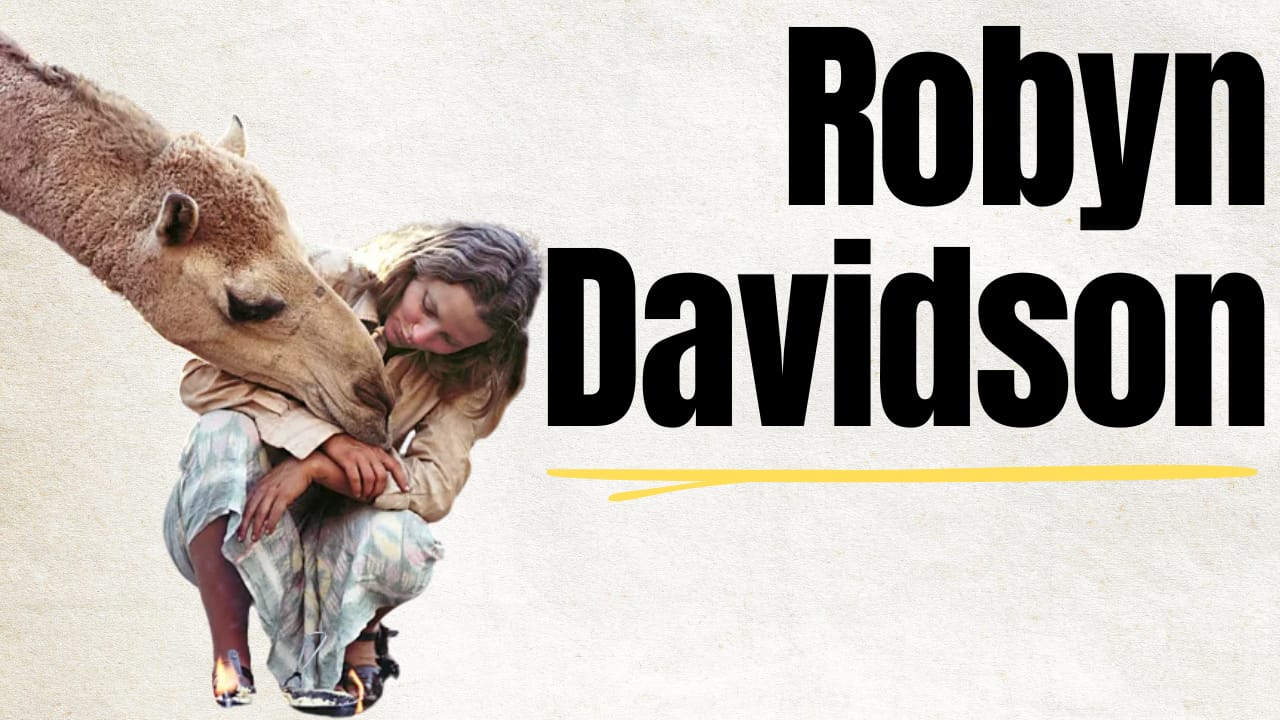- Curious Worldview
- Posts
- Robyn Davidson | Tracks, Unfinished Woman & A Life Of Nomadism
Robyn Davidson | Tracks, Unfinished Woman & A Life Of Nomadism
New Pod: Robyn Davidson - Aussy Legend
hey mate! Just in case you’ve been forwarded this email but would like to subscribe - click the link here.
I've Anticipated This Interview For 6 Years.

Robyn has been a 'dream' guest ever since I started this podcast. I wanted to do it in person, in Australia, and so earlier this year, embarked on the long drive to Victoria to make it happen.
Robyn Davidson has lived one of the most mythologised lives in Australian memory. She unintentionally burst onto the scene with Tracks, a 2,700km camel trek across the Simpson desert, but then retreated from the literary fame and living between here and there lies a far deeper inquiry into truth, memory, and what it means to be free.
Robyn reflects on her lifelong resistance to labels. Not a “writer,” not a “traveller,” not a “feminist icon,” but simply, as she says, “a person.” We speak about memoir, the slipperiness of memory “in retrospect, memory is imagination”.
She speaks candidly about solitude, beauty, and depression, her family, fame, about the distortion of the famous photographs “Rick made me look like a Vogue model, that wasn’t me”, and her uneasy relationship with literary celebrity in London alongside Doris Lessing, Salman Rushdie, Christopher Hitchens, Martin Amis and more.
“Whenever you write in the first person, you are necessarily creating a character — a doppelgänger. She is me, but she’s not quite me.”“The truth is, memory is imagination.”“I worship the phrase ‘I don’t know.’ If you don’t have ‘I don’t know,’ you can’t learn anything.”“If you have a firm identity, you’re trapped in it.”
In this podcast you can expect the following topics.
The Performed Self & Identity
“Whenever you use the first-person pronoun, you are necessarily creating a character.”
The Narrative Fallacy
“We invent neat, linear, emotionally satisfying stories to explain what happened… but the world is messy, chaotic and driven by chance.”
Freedom, Nomadism & Refusal to Be Fixed
Freedom and movement — literal and intellectual — define her resistance to labels like “travel writer” or “author.”
Chance, Fate & Serendipity
“On the tiniest turning point you can head off in a billion directions.”
Depression, Nihilism & Meaning
“It’s a terrible pain that hovers somewhere between the physical body and the mental body.”
“To learn how to deal with a profoundly nihilistic view and to counter that view — that’s been the most formative moment of my life.”
Beauty & Objectification
“If that journey was about anything, it was about being the subject of my own life, not an object.”
Feminism, Rebellion & the 1968 Generation
The spirit of the late-’60s counterculture — radical freedom, equality, and experimentation — shaped her worldview.
Authenticity vs. Fame
“What I was interested in was knowledge and whether people were genuine or not.”
Free Will, Doubt & the Human Condition
“I worship the phrase ‘I don’t know.’ Because if you don’t have ‘I don’t know,’ you can’t learn anything.”
Consider sharing this interview with a mate, colleague, brother, sister, whoever you think might be interested in this as well.
Here is a transcript of the opening exchange from the conversation…
Ryan
You're worried about the narrative fallacy in writing the memoir? Do you think the same applies to doing an interview?
Robyn
I think whenever you have to speak in a certain way, in a certain form, no matter how truthful you want to be, there is some process by which you are making a character of yourself. So there's a weird kind of doubling going on.
Ryan
You're worried about doing the Robin Davidson performance?
Robyn
haha yes, the Robyn Davidson performance.
Well, I suppose I see it more when I'm writing. It's much more clear then that the Robin Davidson on the page is not the real Robin Davidson. And that doesn't mean there's any untruths or any lies or that it's not genuine. I take a lot of trouble to try to get my ego out of the way. But nevertheless, the process of writing is creative process. You are emphasizing some things, ignoring other things, creating structure and all of that, particularly when you are a character in that work, well you become a character.
Is it because it's also elevated, you spend so much time constructing the perfect sentence. And it feels like that maybe isn't really who I am. This is the best possible version of myself. Or is it something else?
No, it's something else. Something else. I I care deeply about making good sentences. You know, I care a lot about not writing shit, basically. No, it's more to do with making a character on the page. And that character is a sort of doppelganger. She is me, but she's not quite me.
It's quite disconcerting when you think about it. I think most writers don't think about it, particularly in this memoir. It was very important for me to be aware of that and as I said before to get my ego out of the way as much as possible.
Ryan
And that's because the problem of memory, which you have spoken about, like you're, you're finding correlation between causation when in fact, how can you even say somebody is past the event, whether they had anything to do with each other or not.
Robyn
Yeah, indeed. Look, it's partly that, but I think it's more subtle than that. It's some strange process if you're a writer.
And if you're using the first person pronoun, you are necessarily creating a character. And how conscious you are of that is the sort of, I guess, is the morality of the memoir. And I do think it's an extremely slippery genre. In fact, I don't particularly like memoir.
Reply